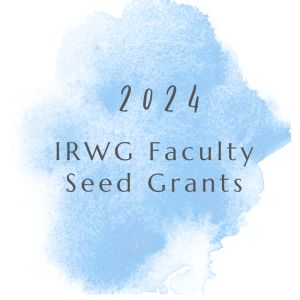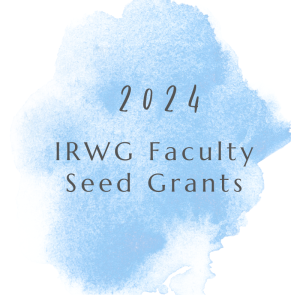Spring 2024 IRWG Faculty Seed Grants


Established in 1996, IRWG Faculty Seed Grants are designed to stimulate gender research across the university.
This spring, IRWG awarded 10 seed grants in support of individual and collaborative research projects across disciplines, schools, and colleges, including LSA, SMTD, Public Health, Michigan Medicine, Nursing, Social Work, and UM Dearborn. This cycle provided over $52,000 in funding for faculty projects.
Recipients and descriptions of their projects (in alphabetical order) are:
Samia Abdelnabi, Postdoctoral Fellow, National Clinician Scholars Program, Department of Health Behavior and Biological Sciences, School of Nursing
Collaborators: Lisa Kane Low, Associate Dean for Professional Graduate Studies, School of Nursing, University of Michigan; Dalia Khalil, PhD, Associate Professor, College of Nursing, Wayne State University; and Rouba Ali-Fehmi, Professor of Pathology, University of Michigan
Project Title: Understanding the reproductive and sexual health educational needs in Muslim women residing in the U.S.
The underrepresentation of Muslim women in the U.S. has led to insufficient data on their reproductive and sexual health needs. It is apparent from prior studies that Muslim women are usually hesitant to seek healthcare due to potential misunderstandings or discrimination, religious beliefs, family influence, and societal prejudices. This study seeks to understand the experiences, perspectives and reproductive educational needs of Muslim women. This research intends to pinpoint obstacles in reproductive and sexual health education and service, with the focus on overcoming barriers to enhance the knowledge, healthcare accessibility, and overall reproductive and sexual health in Muslim women.
Adriene Beltz, Associate Professor of Psychology, College of Literature, Science, and the Arts
Project Title: Individual Variation in the Psychological Correlates of Hormonal Intrauterine Device Use
Intrauterine devices (IUDs) are used by 150 million women. Despite being an imperative tool for contraception and reproductive health, hormonal forms can present unwanted psychological side effects for some users; there are replicated associations between hormonal IUD use and depression. These associations often overlook variation among heterogenous users, likely occluding important individual differences linked to age, race/ethnicity, and gynecological history. This project will delineate variation in the potential psychological impacts of hormonal contraceptives in a large diverse sample, revealing who may be at risk–or benefit–from IUDs, and thus, informing decisions about reproductive health and empowering people with uteri.
Lisa Fedina, Assistant Professor, School of Social Work
Collaborators: Maria Jose Baeza Robba, PhD, BSN, RN, Research Fellow University of Michigan Center for Global Health Equity; Olufunmilayo O. Banjo, PhD. Associate Professor Department of Demography & Social Statistics, Faculty of Social Sciences, Obafemi Awolowo University (OAU), Ile Ife, Nigeria; Eugene K.M. Darteh, Ph.D. Professor/Dean, Students Affairs, University of Cape Coast, Ghana; and Michelle L. Munro-Kramer, PhD, CNM, FNP-BC, FAAN, Assistant Professor, Suzanne Bellinger Feetham Professor of Nursing, Director of Global Programs, University of Michigan School of Nursing
Project Title: Exploring Recovery-Seeking Practices and Voicing Trajectory: A Comprehensive Study Among Sub-Saharan Africa Female University Students Who Have Experienced Intimate Partner Violence
Female university students in sub-Saharan Africa (SSA) experience high levels of gender-based violence, including intimate partner violence (IPV). Despite the negative consequences of IPV on health and educational performance, there is a dearth of research focused on promoting recovery after IPV among SSA university students. This study aims to better understand recovery-seeking practices and voicing trajectory of female students at two universities in SSA. The findings of this study will identify ways in which SSA female university students are using their voice and partaking in their own recovery, serving as a foundation for developing culturally and contextually appropriate interventions.
Shannon Gillen Lipinski, Associate Professor of Dance, School of Music, Theatre & Dance
Collaborators: Jason Cianciulli, Co-Choreographer; Jason Reese C., MFA candidate; Marshall Chadbourne, Composer; and Katherine Kiessling, University of Michigan dancer and student
Project Title: COUNTDOWN: an interdisciplinary dance theater research project involving two international creations / performances that research the intersectionality of gender and time/meaning, as well as the societal pressures of ‘wellness’ and ‘productivity’
Using choreographic, theatrical and interdisciplinary practices in two international creation projects in Iceland and Germany, this project digs into the intersectionality of gender and aging, as well as to research the societal pressures stemming from our understanding of ‘wellness’ and ‘productivity’. Both processes will culminate in public performances with diverse cohorts of international performers, and will seek to amplify the undeniable power and beauty embedded in our physical wrestling with limited time and meaning, drawing attention to our biases, fears and hopes with regards to making the most of ‘our time here’.
Georgina Hickey, Professor of History, Department of Social Sciences, College of Arts, Sciences and Letters, University of Michigan-Dearborn
Project Title: “We Hope for Better Days”: Maryann Mahaffey, Social Justice, and Electoral Politics in Post-1967 Detroit
Detroit struggled with crumbling infrastructure, a faltering economy, unemployment, crime, and decreased state support in the closing decades of the twentieth century. Many residents refused to give up on their city and found a champion in Maryann Mahaffey, who served on city council from 1974 to 2005. While she was a white woman in a predominantly African American city, Mahaffey became immensely popular. This project traces Mahaffey and the networks with which she worked to create a just city that confronted systemic racism, expanded human rights, and centered the needs of the city’s people rather than large scale developers.
Aliyah Khan, Associate Professor, English and Afroamerican and African Studies, College of Literature, Science, and the Arts
Collaborator: Jocelyn Fenton Stitt, Visiting Professor, Department of Women's and Gender Studies
Project Title: Archiving Guyana: Feminist Digital and Material Preservation and Accessibility in the Caribbean
The right of Caribbean citizens to access historical materials are fundamental to decolonization efforts. This two-stage project is an assessment, digitization, and preservation endeavor at the Walter Rodney National Archives of Guyana—the former colony of British Guiana in the Caribbean. This project catalogs and digitizes archival materials most in demand by and about Caribbean women: genealogy records and community newspapers. Like scholars, local and diasporic Guyanese learn more about their enslaved African and indentured South Asian Indian ancestors through plantation, ship log, and genealogy records. Archive materials are decaying, with no searchable catalog and few digitized materials. The research team’s archival restoration efforts are in partnership with the University of Guyana, Guyana government, and the Digital Library of the Caribbean.
Helen Morgan, Clinical Professor of Obstetrics and Gynecology, Michigan Medicine
Collaborators: Shira Fishbach, MD, resident in Obstetrics and Gynecology, University of Michigan; Payton Schmidt MD, Clinical Assistant Professor of Female Pelvic Medicine and Reconstructive Surgery, University of Michigan; and Melissa Brackmann, MD, Clinical Assistant Professor of Gynecologic Oncology, University of Michigan
Project Title: Why are obstetrician gynecologists leaving clinical medicine? A qualitative exploration
Obstetrician gynecologists serve at the forefront of pivotal issues around gender, reproductive justice and the evolving demographics of its workforce. Amid many challenges to reproductive access around the country, many recent obstetrics and gynecology (OBGYN) residency graduates from the University of Michigan have chosen to stop practicing clinical medicine. There are numerous personal and societal repercussions from the loss of this physician workforce, including impaired access to care for patients and professional losses for the individuals themselves. Given that OBGYN has the greatest proportion of female identifying-trainees, gender equity considerations in this specialty are multi-faceted and crucially important, involving both patients and physicians. We aim to determine what factors are contributing to attrition from clinical practice to develop interventions that address physician stress points and improve career longevity and productivity in OBGYN.
Seda Saluk, Assistant Professor, Women's and Gender Studies, College of Literature, Science, and the Arts
Project Title: Contesting Vaccines: Reproduction, Race, and Nation in Turkey
This project examines a pressing public health concern: the decline in vaccination rates. Drawing on ethnographic fieldwork in Turkey, it probes how the emerging parental distrust of childhood vaccinations interacts with gendered and racialized biopolitics, particularly framing Syrian women’s reproduction as a threat to the health of the Turkish nation. It explores how health practitioners and ordinary citizens, especially mothers who are often the primary decision-makers for their children’s vaccination, use and contest gendered and racialized stereotypes to (de)legitimize different healing practices and how this (de)legitimization produces new regimes of exclusion in the Middle East. This interdisciplinary project sheds light on how debates around infectious diseases and vaccines are intimately tied to questions of gender, race, and nation.
Melisa Scott, Certified Nurse Midwife, Department of Obstetrics & Gynecology, Michigan Medicine
Collaborators: Angela Johnson, PhD; LaTresa Wiley, LMSW OV Cofounder & Co-facilitator; Jamie Villalobos, Our Village project manager; and Joanna Kuang, Medical Student, University of Michigan Medical School
Project Title: Our Village: Motherhood was never meant to happen in isolation
In the US, Black Mothers hold the joy of pregnancy with the tremendous weight of high mortality and morbidity rates. Our Village (OV); a support group with wrap-around services, was born in response to women requesting a space where they could connect, learn and support one another. The women not only wanted to survive pregnancy, but they wanted to thrive and find joy and community during pregnancy. Attendees experience decreased social isolation, increased wellness, decreased stress and a reduction in the negative impact of social determinants of health. OV is improving the health of the Black mothers. With the help of funding from the IRWG faculty seed grant, OV will be able to support efforts to collect and disseminate research efforts publically.
Sara Stein, Research Assistant Professor, Health Behavior and Health Education, School of Public Health
Collaborators: Maria Galano, Assistant Professor, Psychological and Brain Sciences, University of Massachusetts; Alison Miller, Professor, Department of Health Behavior & Health Education, School of Public Health; Evelyn Mercado, Assistant Professor, Department of Psychological and Brain Sciences, University of Massachusetts Amherst; and Holly Laws, Senior Lecturer, Psychological and Brain Sciences, Director of Methodology, Center for Research on Families, University of Massachusetts Amherst
Project Title: Testing the Feasibility of Using Daily Diaries to Trace Spillover Effects of Maternal Trauma and Experiences of Racism on Parenting in Mothers of Color
Maternal posttraumatic stress symptoms (PTSS) exert strong effects on parenting, with mothers of color experiencing disproportionately high rates of traumatic stress. Yet, no research examines the dual effects of maternal trauma and racism on parenting in families of color. This mixed-methods study will test the feasibility of conducting a daily diary protocol with traumatized mothers of color to characterize how experiences of racism and daily PTSS contribute to inconsistency in parenting. This work seeks to inform targets of intervention to reduce intergenerational trauma and give voice to the experience of mothers living with these marginalized identities while parenting young children.
